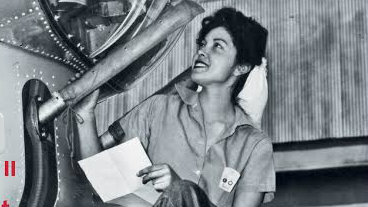
 The name Rosie the Riveter comes with a distinct mental image: the iconic poster of a woman flexing her bicep, with blue sleeves rolled up and a red, polka-dot bandanna in her hair.
The name Rosie the Riveter comes with a distinct mental image: the iconic poster of a woman flexing her bicep, with blue sleeves rolled up and a red, polka-dot bandanna in her hair.
But a new book from Denver author Elizabeth Escobedo presents another image of Rosie. She's wearing a broad-shouldered suit jacket. Replacing the bandana covering slicked-down hair is a pompadoured coif, and she wears bright red lipstick. Perhaps she should be called Rosa the Riveter.
Escobedo's book tells the story of her two aunts and the other Mexican-American women who lived in Los Angeles during World War II. Like white women around them, they got jobs in a factory. Ida Escobedo made bombs.
But unlike other women, many Mexican-Americans still struggled to find their place socially, Escobedo writes. That led some to don zoot suits, like those worn by their male counterparts, but adorned with feminine touches. Yet, while the zoot suits were popular among other Mexican-Americans, critics used the fashion to stereotype Mexican-Americans and stir fears about Latino gang culture.
Escobedo's book is "From Coveralls to Zoot Suits: The Lives of Mexican-American Women on the World War II Home Front." The author teaches history at the University of Denver.









